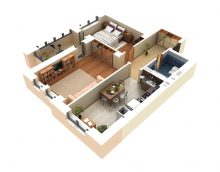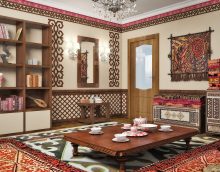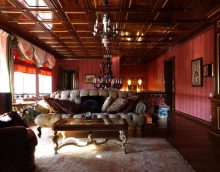Patchwork style in the interior: development history, use in design, master class.
The patchwork style is a very interesting technique for creating all kinds of interior additions from bright scraps of fabric. Things created in this way will add warmth and comfort to the home.

Design in this style looks very beautiful and unusual.

This design will bring comfort and warmth to the house.

Patchwork style is created using different parts of the fabric.
Content
The history of development
It’s impossible to trace the history of the emergence and development of the patchwork. Although, according to some reports, it is known that it originated in the east. In Japan, many museums exhibit exhibits representing ancient clothes, decorated with elements from small pieces of fabric.
Other sources report that the very first patchwork quilt was discovered in Egypt. It was created in 980 BC.

Some sources claim that this style appeared in Egypt

In Japan there is a museum with patchwork elements.
In European countries, the first mention of patchwork appeared in the 16th century. It was during this period that bright Indian fabrics became in demand, bedspreads and other types of home furnishings came into fashion.
In our country, quilts appeared in homes only in the 18th century. In addition, rugs and shreds of matter appeared in Russia. They were called henchmen.

The first mention of the patchwork in Europe appeared in the 16th century

The design of the room in the style of patchwork is sure to cause interest.

Design in this style will perfectly complement the interior.
Applying Patchwork Style
The patchwork technique gradually received the title of style. Designers explain this by the fact that this type of art can be applied to absolutely any interior item. It can be small elements of the decor of the room and decoration, for example, one of the walls.
The patchwork style in the interior is a fairly economical form of art. To create a thing you don’t have to buy a lot of fabrics, accessories, tools. In most cases, enough scraps of fabric, old wallpaper, are available. At the same time, it is recommended for beginners to start working with simple and obedient materials. The most difficult are such fabrics as silk, rayon, lace, fur. But linen, chintz, calico, tight knitwear or jeans are quite suitable.
Let us consider in more detail the options for applying the patchwork in the interior.

This style can be applied to any subject.

Design in this style will not hit your pocket much
Wall decoration
Do not think that patchwork technique is suitable to think for soft and cozy decor items. Of course, to make all the walls in the room from pieces is bold, but one of them is quite possible to single out. The design will be original.
For work you will need:
- cuts of wallpaper in different colors (as a rule, after each repair a few pieces remain);
- glue;
- scissors;
- stationery knife.
The shape of the flaps can be absolutely any, it all depends on the imagination of the master. But more often even squares, rhombuses or triangles are used.

Patchwork style wall design is easy

Patchwork style furniture will perfectly complement the room interior.

The fabric with flowers will look very beautiful
So, which wall in the room is better to highlight in this way? Several interesting options are possible.
- A wall for a TV or one that will have a sofa. The panel above the upholstered furniture looks very stylish.
- At the head of the bed in the bedroom. Moreover, it can be both the entire wall, and its part. For example, in the center.
- In the nursery this way you can decorate any wall. Usually, kids like to take part in patchwork wall pasting.
- In the bathroom, the patchwork in the interior is also appropriate. You can purchase tiles of different colors and assemble the composition yourself. And you can find in specialized stores ready-made tile in the style of patchwork.
In an effort to create a unique design, the main thing is not to overdo it. Patchwork in the interior is, of course, a bright patchwork technique. But the selected colors should still be compatible. Sometimes just two colors in a uniform combination are enough. To avoid problems with sticking, it is recommended to choose wallpapers of the same quality:
- paper;
- non-woven;
- vinyl.

It is worth remembering that the colors in the interior should be combined

Patchwork style is appropriate in any room.
Furniture Items
This technique is often used for furniture decoration. In this case, you can use old, lost-looking products of the furniture industry. After a fascinating restoration, they will be as good as new and will bring originality to the overall interior of the room.
The patchwork allows you to design not only upholstered furniture trimmed with fabric, but also cabinet. This is done quickly and easily. To work, you need a sketch and a self-adhesive film of different colors.
Upholstered furniture is not necessary to give to the masters to replace the upholstery or do this complex procedure yourself. It is quite possible to sew bedspreads, covers, capes using the patchwork technique. Convenience lies in the fact that, if necessary, it will not be difficult to remove and wash them.

Very beautiful curtains can be made from parts of the fabric.

Instead of sheathing, you can make beautiful bedspreads

Furniture sheathed in this style will look very unusual
Bright small pillows in patchwork covers or cozy bedspreads look original against the background of plain soft furniture. They will certainly attract attention and will become the highlight of the living room design.
The main advantage of the patchwork style is the ability to use old, long-forgotten shreds of fabric in the work. It’s enough to sew them into any composition and the whole interior will be transformed.

Old fabrics are great for this style.

Pillows look very nice against the background of furniture
Decor
The patchwork went into the design of a modern interior much deeper than it seems to beginners in this matter. The technique is applicable to everything. With your own hands, you can decorate any home decor item. It can be a lampshade for a floor lamp or a bedside lamp, curtains, rugs, pillows. Often, designers hang a picture in the form of a composition of colorful parts.

You can design anything in Patchwork style.

In the kitchen you can make a patchwork style apron

Patchwork-style wall will catch the eye of guests
Textile patchwork: a master class for beginners
Do-it-yourself things add a special atmosphere to your home. They allow you to fill the interior of the apartment with unique objects. Starting to work in the patchwork technique, it is better to pay attention first to the simplest methods. The table shows the phased instructions for creating a pillow with your own hands.
|
Title |
Materials |
Actions and Tips |
|
Blanks |
Fabrics, scissors, threads, needle, iron, pins, soft filler, sewing machine |
First you need to prepare all the necessary materials and tools so that they are always at hand. |
|
Textile preparation |
Fabric, scissors |
It is better to assemble the base fabric in squares. The number and size of the pieces depend on the dimensions of the pillow. |
|
Mid pillow |
Fabric filler |
A circle is cut out of the fabric, and a small part of the filler is laid on its middle and fixed with a machine seam. |
|
Sewing parts |
Prepared squares |
All shreds are folded diagonally and sewn in a circle on the middle workpiece. Continue sewing until the desired flower size is obtained. |
|
Work with the workpiece |
Harvesting, scissors |
After you need to cut in a circle all the sewn petals |
|
Parts fastening |
Harvesting, sewing machine |
The resulting textile roses are distributed on the fabric and fixed with a machine zigzag. |
|
Registration |
Fabric, thread, needle, pins |
To give a special style to your needlework, you can arrange the composition with leaves. |

For design in the style of patchwork special skills are not required.

Walls in soft colors will look very beautiful.
Initially, of course, the basis of the patchwork style was textile materials of various kinds. But with the development of new design solutions, you can increasingly find this technique using a wide variety of materials. Do not be afraid to experiment. The main thing is to think over the idea well, choose the right color scheme, that the finished work was not motley or even flashy.
It is not necessary to cut the squares and stitch them yourself. Specialty stores offer a wide selection of finished patchwork fabric.
Patchwork style or patchwork technique - it is interesting and unique. Working with it, it is impossible to sew even two identical products.
Video: DIY patchwork in the interior































































